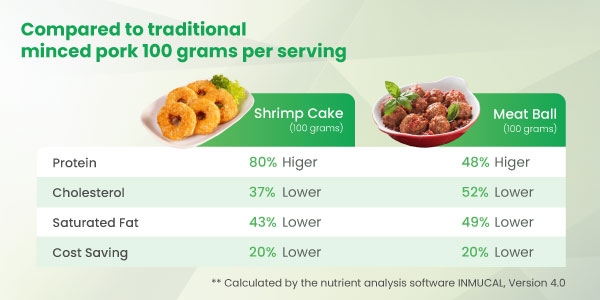Promotional Features
Pioneering the evolution of plant proteins for enhanced health and wellness at an affordable price
The global demand for protein, as highlighted by the Food and Agriculture Organization (FAO) of the United Nations, surpasses a staggering 500 million tons each year.
Of this figure, 350 million tons are attributed to meat, while another 180 million tons are derived from fisheries. What's concerning is the projection that over the next 30 years, food demand is set to surge by 70%, with protein demand potentially doubling.1 Developed countries already exhibit high levels of protein consumption, and this trend is anticipated to persist, raising the threat of imminent food security challenges.
Attempting to meet the burgeoning global food demand by relying on traditional protein sources, such as meat and fish, is a daunting task, if not an impossibility. This approach would place an insurmountable strain on our already limited resources and exacerbate environmental issues, particularly the emission of vast amounts of CO², further exacerbating the climate change crisis.
The solution lies in plant-based protein sources, a vital key to supplying the world's growing population with ample protein. The production of plant-based meat is significantly less resource-intensive compared to livestock. In contrast to protein sourced from animals, cultivating plants for protein drastically reduces greenhouse gas emissions, land usage, and energy consumption.2
Therefore, plant-based meat is emerging as a sustainable protein source for all. By the year 2035, the transition to plant-based meat and eggs will have conserved over one gigaton of CO² emissions and saved 39 billion cubic meters of water, according to data derived from The Blue Horizontal Study on Environmental Impacts of Animal and Plant-based Foods.
Considering the resource-efficient nature of plant protein production, it becomes evident that the cost of plant-based proteins should be more accessible and economical compared to animal-derived counterparts.
As Dr. Werawat Lertwanawatana, CEO of SMS Group, aptly states: "The costs of most plant proteins are only about half of those of animal proteins." With alternative proteins poised to account for 11% of the protein market by 2035, the future seems promising.
Why plant-based foods are slow to reach their full potential
In recent years, plant-based meat substitutes have attracted substantial global attention. However, their growth trajectory has fallen short of initial expectations, as numerous reports suggest major plant-based manufacturers have faced challenges in seizing the market.
According to 2022 data, as of 2021, the market share for plant-based products in the US remained static at 1.4%. By 2022, this share even experienced a slight decline of 0.5%, while conventional meat sales saw an increase of $300 million.3
A quest for taste and experience
Delving into the core reasons behind the benefits of plant-based meat products reveals a recurring theme: taste and texture concerns. Extensive research underscores that, despite the growing popularity of plant-based diets, issues related to subpar texture and a taste that falls short of the meaty ideal continue to be primary factors influencing consumer choices.
Surmounting the formidable challenge of crafting plant-based meat offerings that deliver both an appealing texture and flavor, along with an overall satisfying dining experience, remains a pivotal task.
The vegetarian market is still niche
While the vegetarian market has witnessed steady growth in recent years, it remains relatively small compared to the dominant meat-centric market. As such, the logical next step is to target flexitarians, a demographic that captures 40% to 50% of the European and US markets, as highlighted by ProVeg International in 2023.4
The rapid growth of flexitarians, constituting almost a quarter of the global population, signifies a lucrative market for partial meat substitute products. This includes offerings made from legumes, dairy-free alternatives, seafood plant-based products, and plant-protein based items.
Data from Proveg International 2022 reveals that nearly 30% of Europeans have embraced flexitarianism, with over half (57%) expressing their intent to gradually reduce meat consumption.4 This trend indicates a growing emphasis on health and a return to more natural dietary choices, fostering an increased receptivity to plant-based alternatives.
As Mr. Khem Wanglee, Managing Director of SMS Corporation, explains: "The plant-based market, while niche, demands complex ingredients to craft delectable dishes. The company is expanding its focus to cater to flexitarians and even appeal to meat-eaters with healthy protein ingredients”.
In addition, consumers today are highly price-sensitive, whether they prioritize health or environmental considerations. While plant-based products remain less affordable than traditional meats, the latter will maintain their competitive edge due to lower costs. Attempting to position vegan products as luxury items is challenging, given their plant-based ingredients which do not justify a triple price tag in consumers' minds. What today's consumers seek is a harmonious blend of health benefits, delicious taste, and affordability.
Transforming the food industry with SMS plant proteins
SMS Corporation is exploring the future of foods by, pioneering the evolution of plant proteins in everyday meals. By seamlessly incorporating plant proteins into consumers’ favorite foods, SMS is committed to transitioning from a 1% niche market to a mainstream 99%, all while delivering remarkable benefits for consumers’ health and wallet, and the environment.
SMS is at the forefront of sustainable and functional plant protein and modified tapioca starch solutions. The innovative campaign, PHYTO 50, offers high-protein and balanced diet solutions simply by replacing and fortifying 50% of animal protein content in various food products with over 50% plant proteins.
Dr. Siwarutt Boonyarattanakalin, Innovation Director of SMS Corporation, says: "With PHYTO 50, we unlock the full potential of plant proteins, delivering enhanced cost-effectiveness, fortified protein supply security, and a sustainable environment."
PHYTO 50 foods seamlessly integrate into consumers’ favorite recipes, providing increased protein content at a lower cost than ordinary meat-based products. The resulting PHYTO 50 foods have their taste and texture inseparable from their original recipes. This leads to improved protein absorption efficiency and muscle synthesis.
Combining plant proteins with animal proteins broadens the spectrum of essential nutrients, including a complete amino acid profile, vitamins, and minerals, compared to a strict vegetarian diet. It helps prevent nutrient deficiencies.
Laboratory tests on PHYTO 50 demonstrate its health benefits. For example, 100 grams of PHYTO 50 minced pork contains 48% more protein (27g per serving), 52% less cholesterol (20mg per serving), and 49% less saturated fat (3g per serving) compared to traditional minced pork. This alternative not only offers higher protein content but also contributes to a healthier diet while saving costs.
Applying PHYTO 50 to a seafood-based dish, like 'Shrimp Cake’, results in 80% more protein (29g per serving), 37% less cholesterol (81mg per serving), and 43% less total fat (4g per serving) compared to traditional shrimp. SMS's plant protein products and application knowledge can enhance recipe formulations for PHYTO 50, PROTIMATE™ Series (isolated plant protein powder), and I-TEX Series (texturized protein).
These innovations transform the texture, taste, and production cost of various meat-based products. PHYTO 50 meats offer excellent firmness, a bouncy bite, a rich protein source, high cooking yield, and cost-effective production. PROTIMATE™ Series can be incorporated into a wide range of food applications, including beverages, dairy, bakery items, meat, meat analogs, and noodles. Meanwhile, I-TEX™ Series enriches protein sources for meat and meat analog applications.
Research and innovation remain key drivers in maximizing the potential of plant proteins. At the Plant Protein Excellence Center at SMS, researchers are dedicated to formulating plant proteins to turn regular meals into healthy, sustainable foods with optimal cost-effectiveness, as suggested by SMS Group’s Dr. Lertwanawatana. The team of food specialists is available to provide support, ensuring products excel in texture, appearance, and shelf-life.
As the global leader in modified tapioca starch manufacturing, SMS Corporation places a premium on creating significant value for food products through advanced innovation. The aim is to be a sustainable protein supplier, fortifying the food security supply chain.
References
1. Food and Agriculture Organization of the United Nations. (2022). Statistical Yearbook World Food and Agriculture 2022.
2. Ferrari, L.; Panaite, S. A.; Bertazzo, A.; et al. (2022). Animal- and Plant-Based Protein Sources: A Scoping Review of Human Health Outcomes and Environmental Impact. Nutrients. 14(23), 5115.
3. CARNI Sostenibili. (2022). Plant-based meat substitutes are the biggest failure in the food industry’s history.
4. ProVeg International. (2022). How to target flexitarian consumers with plant-based products.
Additional references
InsideHook. (2021). Survey Finds Consumers Think Beef Tastes Better and Is More Nutritious Than Plant-Based Meat.
BCG Food for Thought – The Protein Transformation. (2021).
TMR Analysis. (2022).


